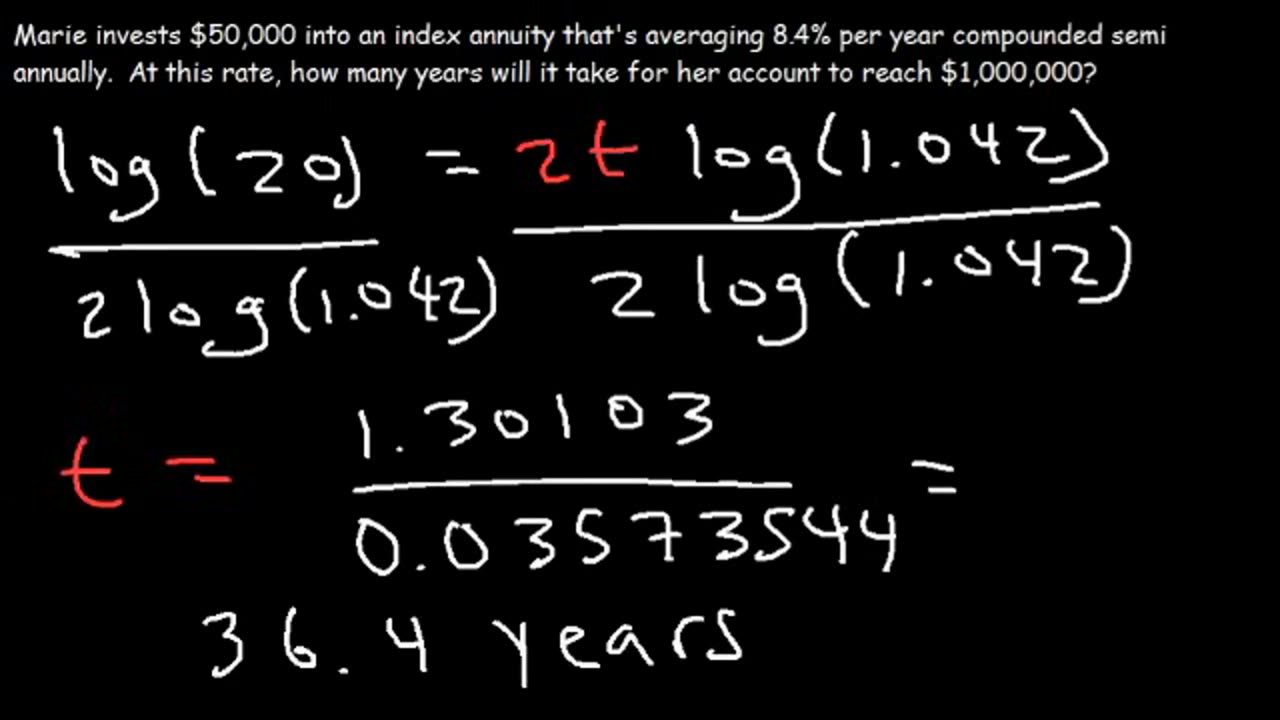Premium Only Content

Calculating compound interest.
Calculating compound interest."""Calculating compound interest."""
It's not just simple addition, folks. We're talking about interest *earning* interest. Think of it as your money making little baby money, and then *that* baby money making even *more* money!
The magic formula is this:
A = P (1 + r/n)^(nt)
Where:
* **A** is the future value of the investment/loan, including interest
* **P** is the principal investment amount (the initial deposit or loan amount)
* **r** is the annual interest rate (as a decimal)
* **n** is the number of times that interest is compounded per year
* **t** is the number of years the money is invested or borrowed for
Let's break it down with an example. Say you invest $1,000 (P = 1000) at an annual interest rate of 5% (r = 0.05) compounded annually (n = 1) for 10 years (t = 10).
Plugging that into our formula:
A = 1000 (1 + 0.05/1)^(1*10)
A = 1000 (1 + 0.05)^10
A = 1000 (1.05)^10
A = 1000 * 1.62889462678
A = $1628.89 (approximately)
So, after 10 years, your initial $1,000 would grow to approximately $1,628.89. That extra $628.89? That's the power of compound interest, baby! Now, if that interest was compounded monthly (n = 12), you'd see an even *better* return. Give it a try with n = 12 in the formula. You'll see the difference. Get compounding!Now, let's talk about why understanding compound interest is like having a financial superpower. Knowing how this works lets you make smarter choices about your savings, investments, and even loans.
Think about it: the more frequently your interest is compounded (that's your 'n' value, remember?), the faster your money grows. Daily compounding (n = 365) is generally better than monthly (n = 12), which is better than annually (n = 1). Of course, the difference might seem small at first, but over long periods, those little gains add up BIG time.
On the flip side, when *borrowing* money, understanding compound interest is crucial for avoiding nasty surprises. Credit card companies LOVE compound interest. If you only pay the minimum each month, a huge chunk of your payment goes towards interest that's compounding daily or monthly. That debt can snowball FAST. Knowing this helps you prioritize paying down high-interest debt quickly.
So, whether you're saving for retirement, investing in the stock market, or taking out a loan, take the time to understand the power of compound interest. It's the difference between letting your money work *for* you or working *for* your money! Get that 'n' value working in your favor!
"""
-
 LIVE
LIVE
Sean Unpaved
1 hour agoGridiron Shocks: Arch's Rough Start, Belichick's Tar Heel Tumble, & NFL Week 1 Buzz
316 watching -
 1:47:55
1:47:55
The Dilley Show
2 hours ago $11.42 earnedChicago in the Crosshairs, Grifters Crash Out and More! w/Author Brenden Dilley 09/02/2025
45K3 -
 LIVE
LIVE
StoneMountain64
52 minutes agoBattlefield Portal has already been better than I realized
97 watching -
 LIVE
LIVE
Viss
2 hours ago🔴LIVE - How To Win in PUBG - PUBG 101
107 watching -
 LIVE
LIVE
Side Scrollers Podcast
2 hours agoVoice Actor ROASTED For Racist Double Standard + Influencer FELONY After Con Threat | Side Scrollers
319 watching -
 1:53:25
1:53:25
Steven Crowder
4 hours agoThe CDC Exodus: RFK Forces Self-Purge of the Corrupt Elite
273K151 -
 2:34:52
2:34:52
The Rubin Report
3 hours agoDave Rubin Can’t Believe This Happened While He Was Off the Grid | Jillian Michaels Guest-Hosts
48.3K17 -
 LIVE
LIVE
Rebel News
1 hour agoFather killed in home invasion, Predator targets toddler, Who's destroying Canada? | Rebel Roundup
340 watching -
 LIVE
LIVE
TheAlecLaceShow
1 hour agoTrump Health Hoax | Warp Speed Truth | UK Protests | Guest: Sheriff Mack | The Alec Lace Show
46 watching -
 1:43:41
1:43:41
The Mel K Show
2 hours agoMORNINGS WITH MEL K - Liberty, Privacy, Sovereignty & Justice: The Battle Ahead 9-2-25
23.9K6